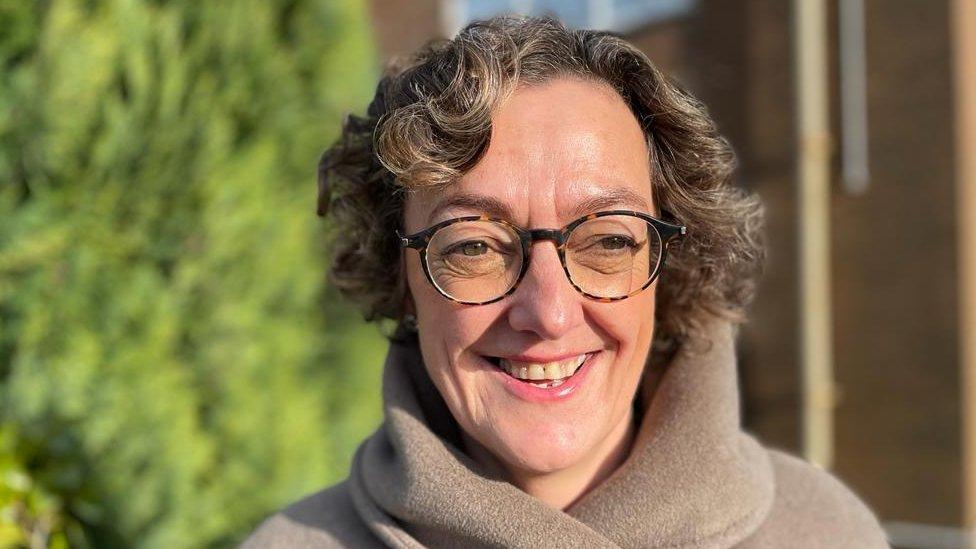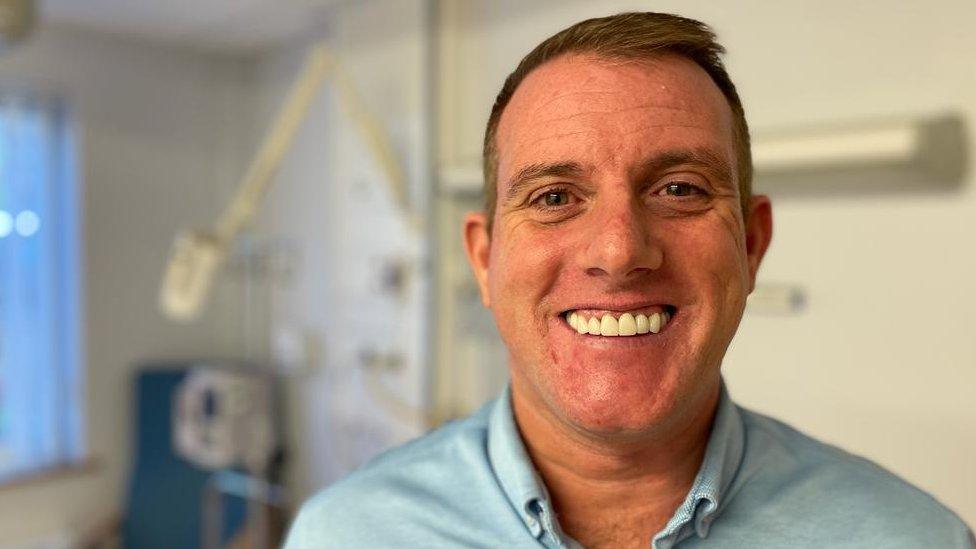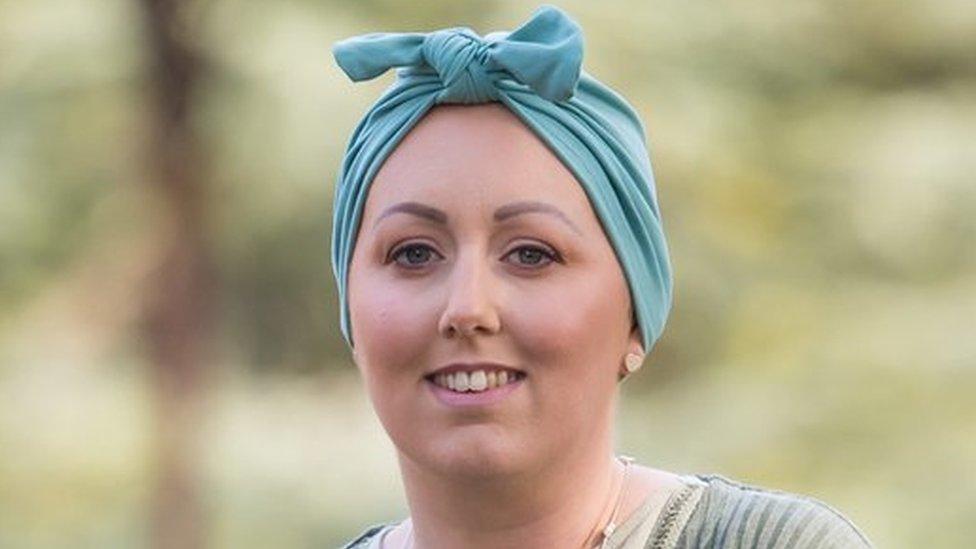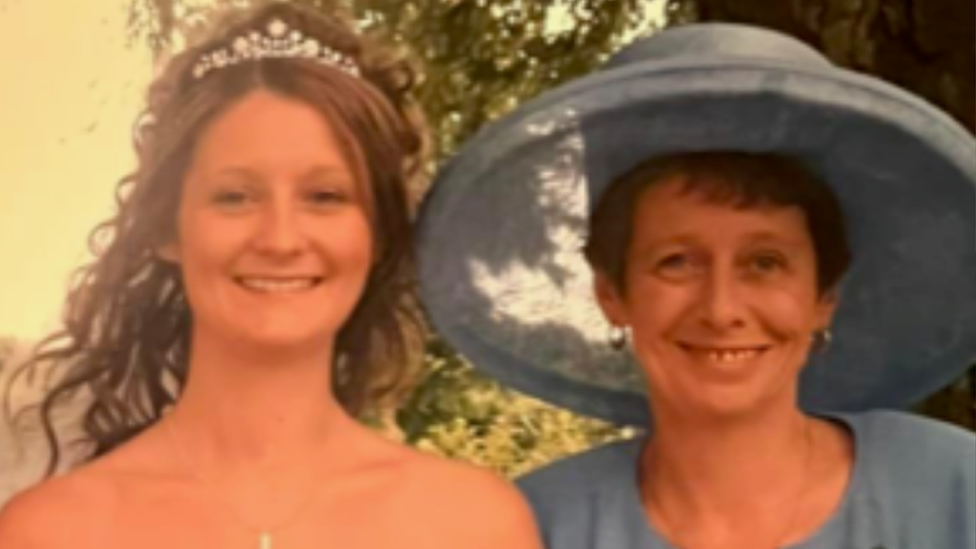NHS: More cancer specialists needed in A&E, doctors say
- Published
Imogen Llewellyn is back to work at the Welsh National Opera three years after being told she had incurable cancer
Being placed on immunotherapy to treat Stage 4 cancer was a life-saver for Imogen Llewellyn.
Three years on, the 34-year-old is currently cancer-free, but said if it was not for specialist doctors, the side effects could have killed her.
The Royal College of Physicians claims Wales needs more oncology experts in A&E to recognise and treat emergencies.
The Welsh government said all acute hospitals were expected to have an acute oncology service.
"As a cancer patient your worst nightmare is to be told your treatment is being stopped because a side effect hasn't been managed properly," said Mrs Llewellyn, a producer with the Welsh National Opera.
She was first diagnosed with melanoma - a type of skin cancer - in 2014 at the age of 26 and was successfully treated.
But five years later she was told it had spread to her lungs.
"That was probably the worst day of my life - being told that you have incurable cancer at the age of 31," she said.
"My little boy was one - it was two days before his second birthday. I hadn't even been married a year."
Her oncologist at Velindre Cancer Centre in Cardiff placed her on immunotherapy, external, which at the time was still a relatively new form of treatment which trains the immune system to fight cancer.
The side effects are numerous and unless properly managed, can be fatal.
On one occasion the side effects caused her to visit A&E, but because the treatment was new, she said doctors understandably did not know how to treat her.
In contrast, her experience of a significant side effect when treated at Velindre was very different.
"I could hardly walk. My body was shutting down and I was scared. I was panicking and they held my hand and took me to a bed, stroked my hair told me that everything was going to be OK.
"I am extremely lucky that my doctor was in the assessment unit that day and he took one look at me and he knew exactly what it was and he knew how to treat it."
Imogen's oncologist runs a toxicity service for immunotherapy across south-east Wales, but Tuesday's report by the RCP said that service was not available in all parts of Wales.
It wants investment in emergency cancer care because of the sheer volume of patients who need urgent care during their treatment.

Dr Hilary Williams is the Wales Cancer Network lead for acute oncology
With about a fifth of acute hospital beds occupied by people who have a cancer-related problems, they add that about a third of admissions could be avoided if same-day care were more widely available in Wales - which in turn would relieve pressure on hospitals.
Dr Hilary Williams, consultant oncologist and Wales Cancer Network lead for acute oncology, said: "Wherever a patient lives in Wales, they should be able to access excellent acute oncology services.
"When people think about cancer treatment, they might think about undergoing surgery or receiving chemotherapy, radiotherapy or immunotherapy in an organised way, perhaps during weekday hours in a specialist centre. But what happens when an emergency arises?"
The report highlights that in some parts of Wales there is only one specialist, meaning patients are unlikely to get the care they need out of hours or when that person is on annual leave.

Dr Ricky Frazer runs an immunotherapy toxicity service
Dr Ricky Frazer is Mrs Llewellyn's oncologist and chairs a UK-wide group of specialists sharing best practice on how to treat harmful side effects of immunotherapy.
"We have been able to keep people out of hospital and identify these toxicities early, so they don't become worrisome or life-threatening."
He said the toxicity service was funded by the Welsh government for south-east Wales, and it now "drives knowledge and research across the whole of the UK".
"But clearly that investment is needed across Wales. A lot of those side effects are entirely predictable, we just need to have the processes in place."
The Welsh government's cancer delivery plan for 2016-2020 made a commitment to seven-day provision for acute oncology services, followed by a "quality statement for cancer" in March 2021, which set out promises for fully integrated services.
However, the RCP said this is still not a reality everywhere.
The Welsh government said: "We have set out a comprehensive approach to improving cancer outcomes, including committing to detect cancer earlier and setting an expectation of all acute hospitals having an Acute Oncology Service.
"Health boards and trusts will plan and deliver cancer services in response to these commitments."
- Published7 April 2022

- Published11 January 2023
